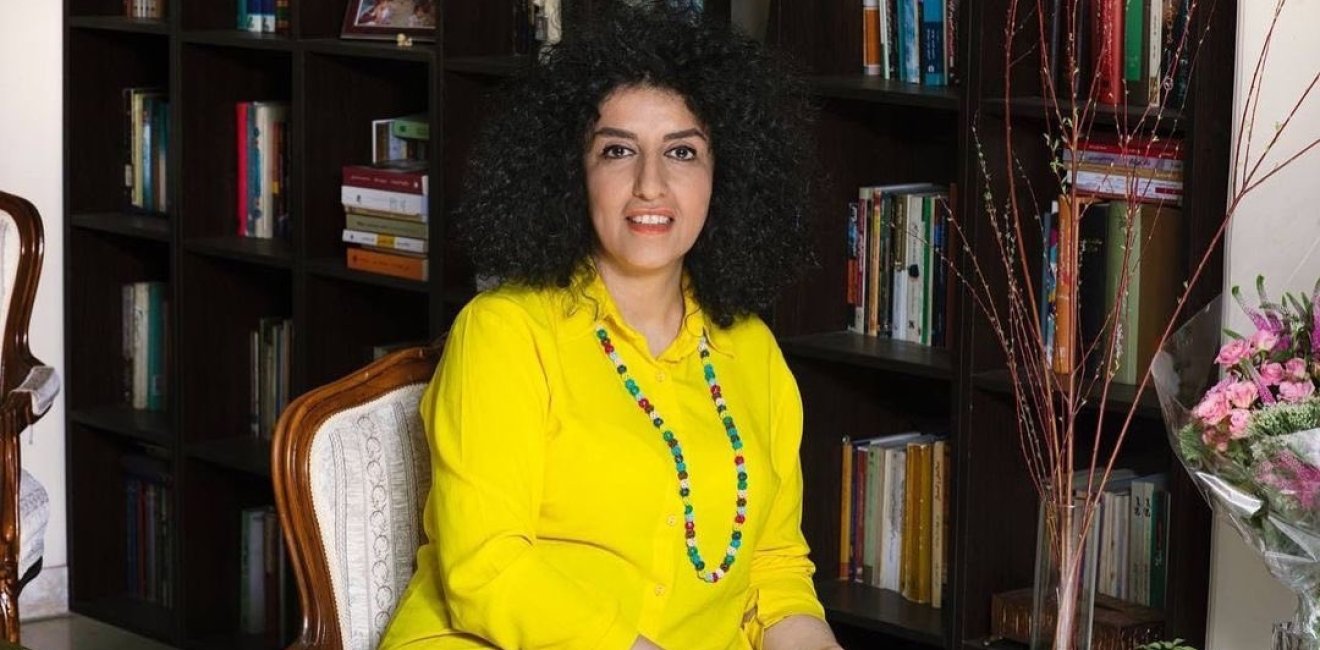
A blog of the Middle East Women's Initiative
Even in her prison cell, Nargess has remained outspoken about the miserable physical conditions in Iran's prisons and the suffering of Iran's women prisoners.
Twenty years after an Iranian woman, Shirin Ebadi, who devoted her life to defending in court women political activists, won the Nobel Peace Prize, another Iranian woman has been awarded the Peace Prize today. Nargess Mohammadi, an Iranian woman activist currently serving a ten-year term in Tehran's Evin prison, was named the 2023 winner of the award. The prize is richly deserved. Nargess, a relentless activist and lawyer, has for the last 25 years defended human rights and political activists and members of religious minorities unjustly victimized by Iran's judicial system.
The Norwegian Nobel Peace Prize is a recognition not only of Narges's heroic efforts but also of the continuing struggle of Iranian women for their rights, for equality under the law and their work against a regime hostile to women's place in society and for four decades has sought to restrict women's choices, degrade, and humiliate them.
Nargess was born in 1972 and was educated in Iran. She studied physics at the university and became an engineer. For a number of years, she worked as a journalist. She married fellow journalist Taghi Rahmani in 1999, also a political activist. Rahmani moved to France in 2012 with their twin children so that at least one of the two parents remained free to care for the family. Nargess has not seen her children in 11 years; she speaks to them on the phone whenever she is out of prison. Upon hearing the news of his mother's Nobel Prize, her son Ali, who lives in France, said," If I could talk to my mother, I would tell her how proud we are of her."
One of Nargess's main achievements, along with other women activists like Nasrine Sotoudeh, has been her campaign against the death sentence in Iran, where capital punishment is common. She is also the vice president of the Defenders of Human Rights Center, founded by Shirin Ebadi in 2003. Together with other Iranian women activists, Narges launched, in 2006, the Million Signature Campaign aimed at repealing discriminatory laws against women. Even in her prison cell, Nargess has remained outspoken about the miserable physical conditions in Iran's prisons and the suffering of Iran's women prisoners.
Only yesterday, she issued a statement from Evin prison regarding the case of Armita Geravand, a 16-year-old girl who, after a confrontation with a 'hijab enforcer' in Tehran's metro train, was seen on video being dragged unconscious out of a metro train and was subsequently taken to a military hospital where she has been lying in a state of coma since. In her statement, quoted in the Wall Street Journal, Nargess said:
"The government's behavior indicates an attempt to prevent the truth about Armita from coming out."
The violence against Armita Geravand seemed like a horrific reenactment of another confrontation over the hijab with the morality police last year that led to the death of yet one more young woman, Mahsa Amini, and has resulted in a public outcry and revulsion. Bystanders say a hijab policewoman confronted Armita after boarding the metro because she was not covering her hair. After the following argument, Armita was pushed to the floor and hit her head. She was bleeding when she was removed from the metro. The official version, as usual, avoids any responsibility. The government claims Armita fell due to a fall in blood pressure.
Reports are circulating that security officials threatened Armita's family, friends, and classmates to stick with the official version. But no one believes the official narrative. As a friend in Tehran, tongue in cheek, once put it to me, "When in Iran girls die after a confrontation with security officials, they either have committed suicide by jumping out of windows, or happen to have experienced low blood pressure, or heart failure."
I called a friend in Tehran this morning to tell her about Nargess's Nobel Peace Prize award. She said, "While grieving for Armita, another young life erased over the hijab, the news about Nargess is a big boost for us and shows that the world cares for young Iranian women."
Author


Middle East Program
The Wilson Center’s Middle East Program serves as a crucial resource for the policymaking community and beyond, providing analyses and research that helps inform US foreign policymaking, stimulates public debate, and expands knowledge about issues in the wider Middle East and North Africa (MENA) region. Read more


Middle East Women's Initiative
The Middle East Women's Initiative (MEWI) promotes the empowerment of women in the region through an open and inclusive dialogue with women leaders from the Middle East and continuous research. Read more

Explore More in Enheduanna
Browse Enheduanna
Women are the Catalysts for Change in Lebanon

How Education Can Empower Young Women in MENA


